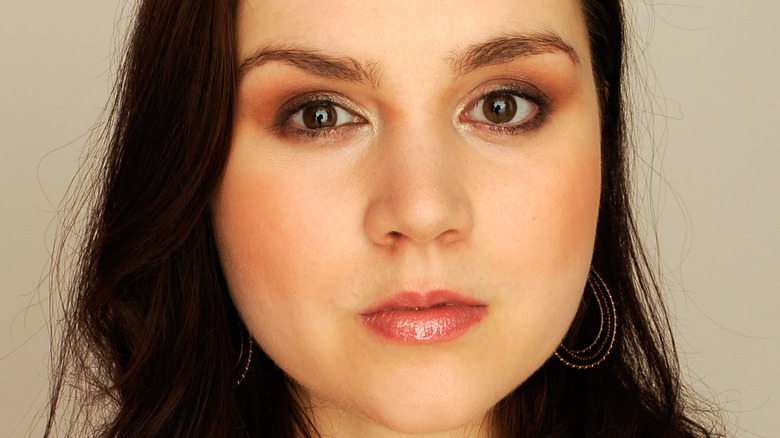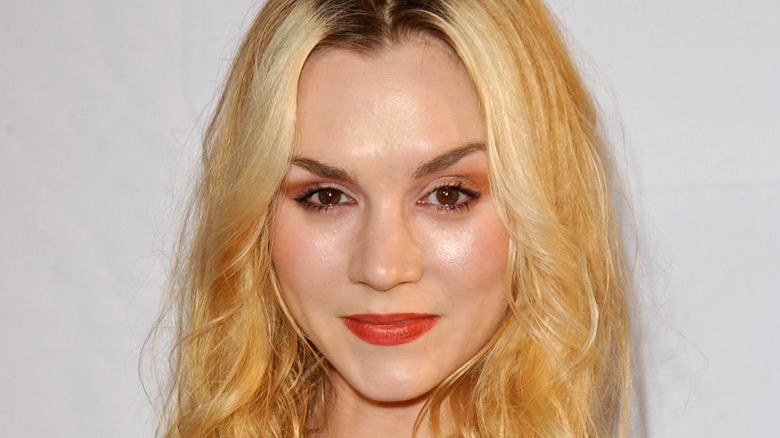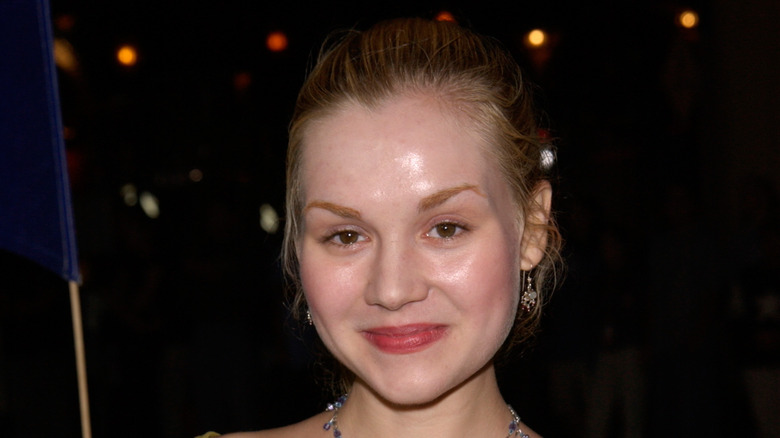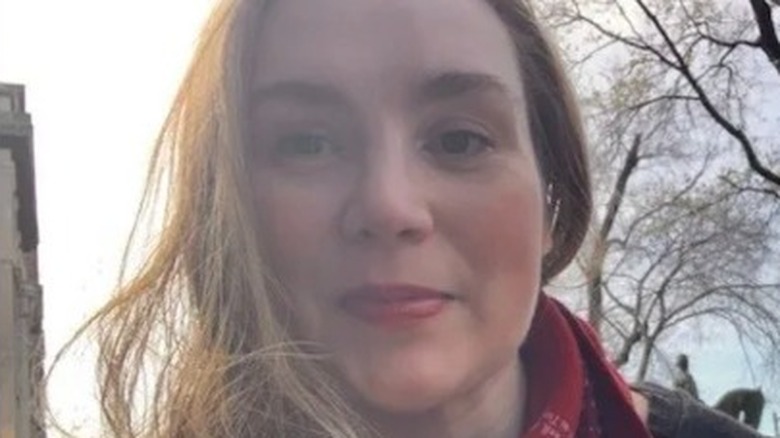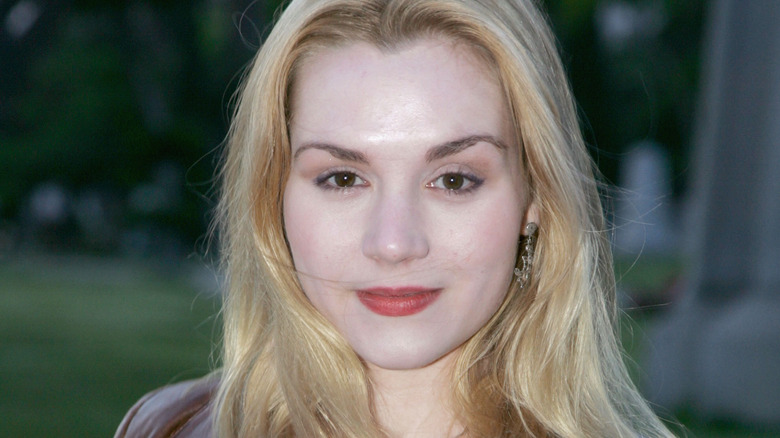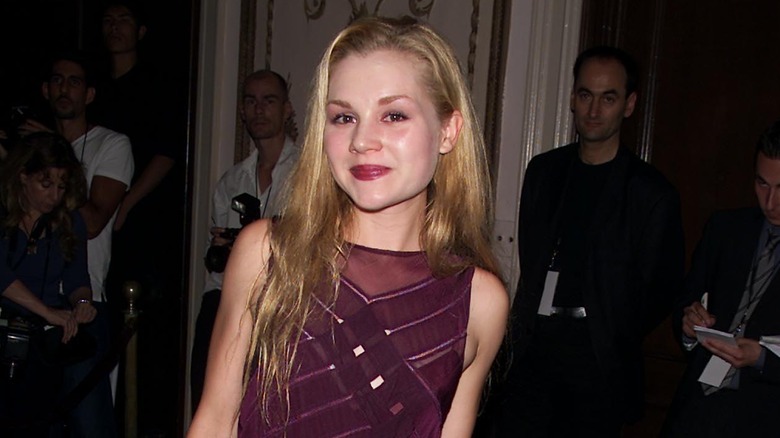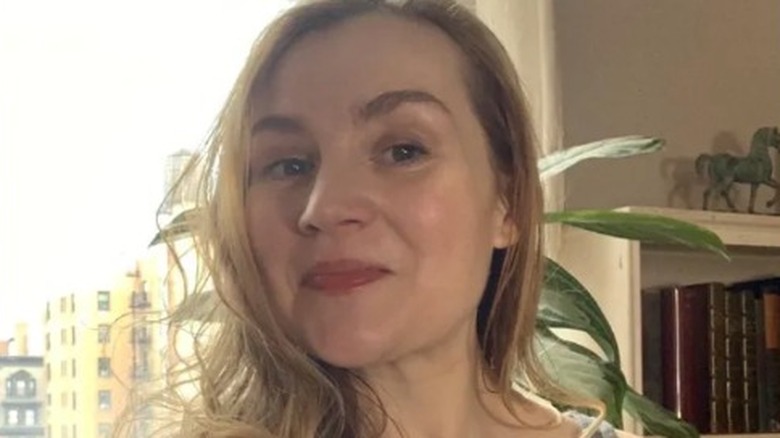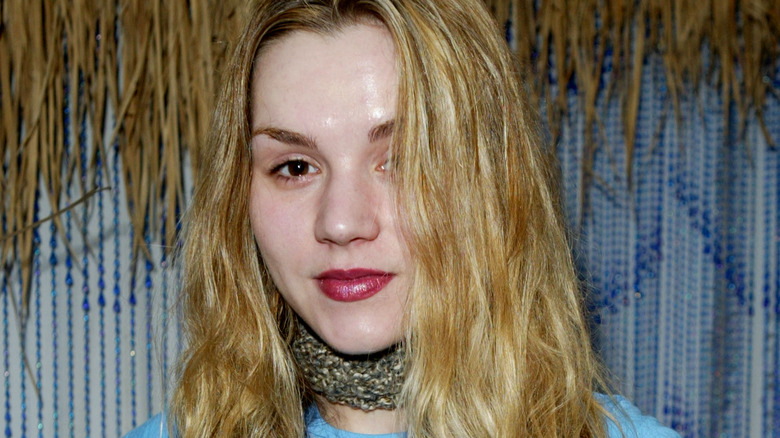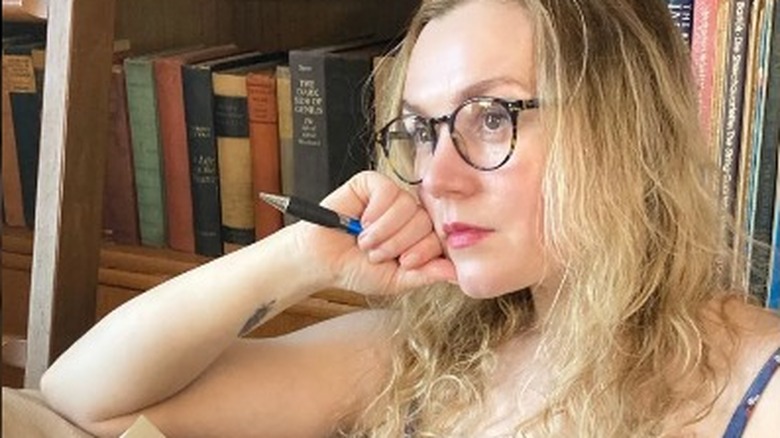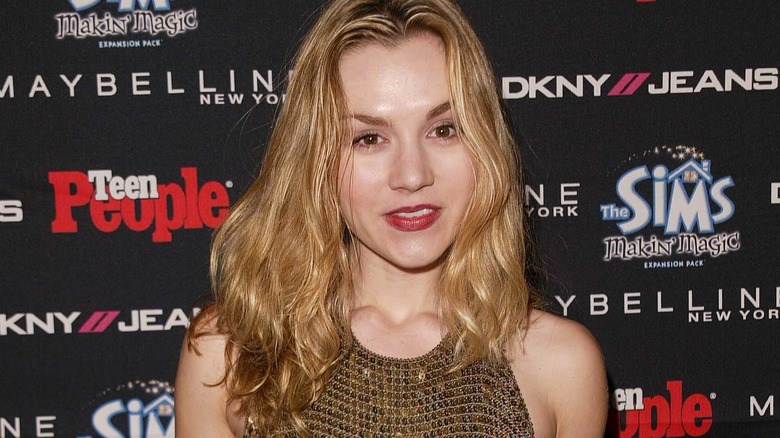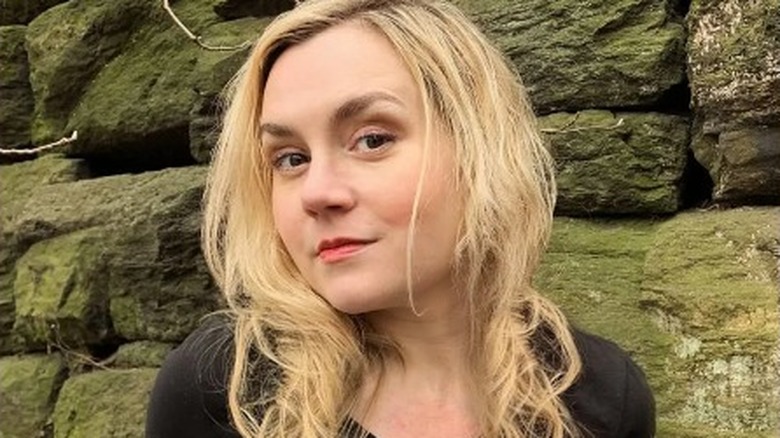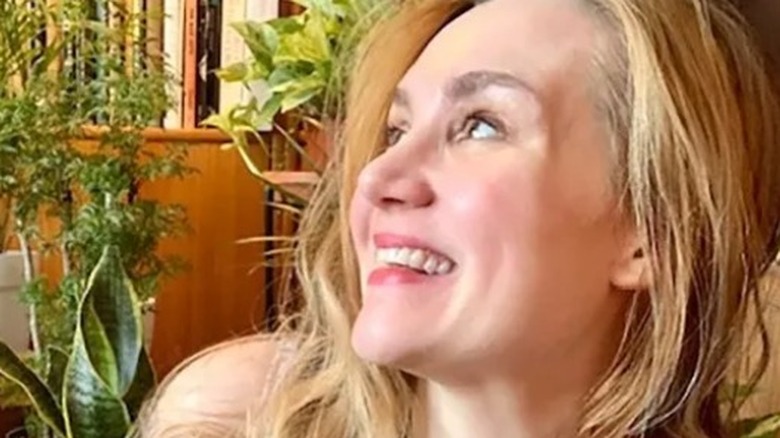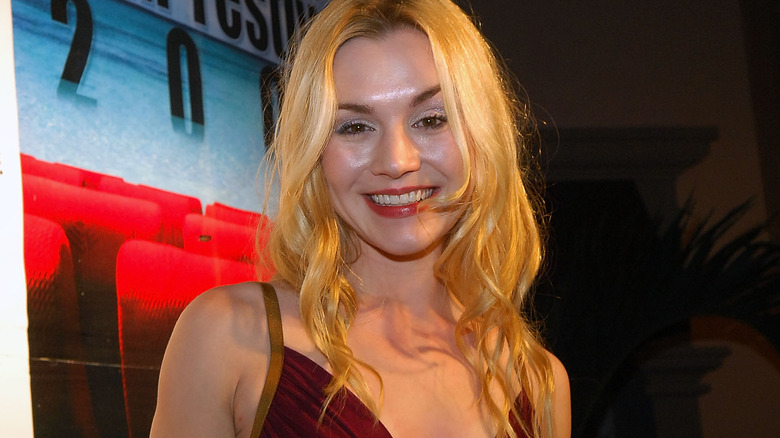Actress Rachel Miner Discusses How Multiple Sclerosis Changed Her Work And Life - Exclusive Interview
You may recognize Rachel Miner from her roles in "Guiding Light," "Californication," and "Sons of Anarchy." But "Supernatural" fans will know Rachel Miner as the demon Meg Masters, a role that's seen her become a regular at conventions. Miner had been steadily working in her acting career when in 2010 she was diagnosed with multiple sclerosis (MS), a neurological disease that changed the course of her life.
MS is a condition that affects the body's central nervous system, as the protective coating around a person's nerve fibers is damaged by the body's own immune system (via Mayo Clinic). This, in turn, interrupts nerve signals that should be sent to and from the brain, resulting in myriad symptoms that vary from person to person. Common symptoms include numbness and tingling, intense fatigue, spasticity, bladder and bowel problems, and cognitive changes. Understandably, being diagnosed with MS is life-changing, as this writer can attest.
To mark MS Awareness Month, Rachel Miner spoke to Health Digest to discuss her own diagnosis, how she manages her career alongside the condition, and how she's advocating for accurate disabled representation in Hollywood.
The first symptoms
Can you tell us a little bit about your MS diagnosis?
For me, it manifested, I thought maybe I'd slipped a disc. I was starting to lose feeling in my extremities, and I was having more and more motor issues and things, but I thought maybe it was a slipped disc impacting a nerve or something. But it wasn't fixing, and finally, I actually went on WebMD and did a search, and I had all these different symptoms that I didn't realize were correlated, and it started to scare me. And so I asked my doctor, I said, "Should I get checked?" And she said, "Yes." And I went for an MRI, and it was obvious from my first MRI. So I'm one of the lucky ones, where it wasn't a long, protracted, trying to figure out what it was. But I think I also covered my symptoms for maybe about a year, year and a half. I just kept kind of like ... keep trucking, I'll figure this out, didn't know what was going on. So that's my story. ... I was diagnosed maybe a week before my 30th birthday.
Oh, I was diagnosed with MS about a week after my 30th birthday. I was like, "What a birthday present." Like you said, you have all those strange little things going on in your body, but think, "Oh, I'm sure that's nothing."
One of the weirdest symptoms that I had was, I certainly hadn't realized that there were so many tiny muscles that we use in our daily activities. And those start to go, especially in my extremities. So whenever I wore flip flops, they would go flying off. I kept losing shoes, and I couldn't figure it out, but it was actually that I was losing those muscles that hold the flip flop in place, and so they weren't staying on. But shoes became one of my first problems, but I didn't realize that was a symptom. ... So it's amazing, and across the years, I've realized how many of the things we take for granted. For me, that's a lot of what's been impacted, just the little muscular movements you shimmy into clothes with. I don't have a good feeling in my hands, so I drop things a lot, or I mistake [things], it's hard for me to differentiate [by touch] if I'm not looking. Just all those small, daily activities that we take for granted. Those are probably, a lot of the times, the most difficult things for me.
How Rachel Miner's acting career was impacted by MS
How has having MS has impacted your acting career?
Well, it impacted it a lot. For me, also, so much was, I guess, my own need to process my illness, and reflect, and be comfortable with who I was with this illness, and how that impacted my relationship to others. Because so much of my personality was never wanting to get in the way, and I love being very self-sufficient, and also being able to help others. So it was an identifying factor to me that things like, at work, on set ... I not only could not be a problem for people, I could take some of the load off other people because I could easily carry more than my weight, so to speak. And so much is physical, as well. And I loved doing my own stunts, and I also was one of those people who would work 48 hours straight, and in the cold, and whatever, and not complain.
And that was kind of how I identified myself, and how I liked working, because, to me, so much was about the community and the camaraderie, and being able to make others' lives easier. And so, it was very difficult for me to deal with the transition into not being able to withstand all of that. And even having to ask for help, and not being able to pull off as much as I wanted to, and feeling like that shook my sense of strength. And I think it's actually a wrong interpretation of what strength is, to think it is only physical, and to think it has to do with not being in the position of ever needing help. But it took me a long time to process that.
So that's where, also, my work with Random Acts, my charity work and volunteer work ... [that's where I can] be a part of a community, and also message out to others that it's okay, all of us, every human being, needs help sometimes. And it's what we need as humans, is to create supportive communities where, sometimes I'll need the help, sometimes you'll need the help, and we can go back and forth comfortably without that feeling that it is better to be in the position of being the helper than the one being helped.
Navigating the pandemic with MS
CONTINUED: But because of all that, I shied away from work for a long time, because it just was very painful to me to not be able to pull off what I wanted to, and to feel like a problem to people in any way. So that was very difficult, so I didn't work for a long time. And honestly, since COVID hit, I haven't worked again, because that has had its own set of regulations and problems, and so forth. And it's been difficult. I'm on an immunosuppressant [drug], so I'm more vulnerable. But also, my father passed away, my mother and I lived together, and I didn't want to risk her health. And I think, for all of us, we're trying to make our way through this period of time and figure out what the best thing to do for everyone, health-wise, is.
Physically, most of the time going out, I used an assistive device, a wheelchair or a scooter. And then, I have horrible balance. ... I have trouble orienting in the world, and balancing, and my nerves don't communicate. My nervous system doesn't communicate well, so I'm very slow and off-balance. ... And that makes just keeping safety protocols of staying sanitized, and keeping gloves on, and masks on, and all that stuff, very, very difficult. I remember, one of my last flying trips, I ended up falling on the floor in the bathroom trying to get my mask on and sanitize, and all that stuff. And I thought, oh, that's the reverse effect.
... I think, again, every human being, each of us, is trying to figure our way through all of this. And I in no way feel victimized. ... I think we all have our own challenges, and I think so much of the world right now is kind of at capacity and trying to make it through.
MS affects each person differently
It's definitely been a really difficult time, but I love everything that you mentioned, because those are things other people might not think about sometimes, or they have the same issues, so thank you for that.
I like to put those things out there because ... and I try very hard with the volunteer staff that I work with to kind of ... for us to model for each other ... [that] it's not about trying to garner sympathy or something, but [about being] able to be honest about the fact that every one of us had different needs and different trials that we're overcoming, and all that. And I think in order to help each other, we have to have that honest communication.
Is there anything you wish people knew you about MS that they don't always seem to?
I think the number one thing I'd love people to understand is how very differently it affects every single person with MS, because it can lead to false assumptions about what another person is going through. And I think that gets in the way of our understanding and our ability to help each other, when we assume we understand, like, "Oh, I know someone with MS, and they have X going on." You might have a very, very different impression than what the person in front of you is going through.
And then, it also can lead to false assumptions that can be harmful to ourselves and to others, in that, well, that person has MS, and they can run a marathon, so I should be able to run a marathon. And it's like, no, because the nervous system is so very complex, and each of us has our nervous systems being negatively affected in different ways. The lesions are in different places, and interrupting different signals. And so, you can be the strongest person who can overcome all the odds, and you're working with a very different set of barriers. So I really encourage people to get that.
Learning to let go
You're so right. It's so difficult, because everybody is dealing with different issues. And you end up putting so much pressure on yourself, thinking why can't I do that? And I think that's such a big part of the learning process, isn't it?
Yeah. I'll say, that's the biggest thing for me ... I think I made my health worse, and I certainly put a lot of mental strain on myself for years, with thinking I could control, or I guess, stubbornly overcome, and fully understand how best to tackle all of my symptoms, and try to diagnose for myself, like, what was it that I ate that made this day worse, and this flare-up worse, and what can I do to make it better? And I'll be honest, after years of trying that and feeling like, if I didn't get it right, it was my failure, I figured out, wait, there's not a lot of logic to this. There's so much to this illness that I do not understand, and even the most advanced neurosurgeons do not seem to understand. And that's not an insult to them, it's just, there's so much about the brain and the nervous system still to be discovered, that I started to let go of that need to control and predict.
And the more that I learned how to [let go] ... I focused instead on finding happiness, and kind of inner peace, by whatever means, meditating and journaling, and finding the relaxation, and laughing at things, and finding the joy in each moment. The more I could focus on that kind of mental wellbeing and peace of mind, actually, the better everything was. But even if it was worse, I felt better. ... That's the only thing that I found that guarantees that symptoms will be less harmful, or flare up less, or I can overcome an obstacle sooner, is just by letting go a bit.
Being more forgiving with yourself
It's completely random sometimes, isn't it? The way MS flares up. It's nothing you did, you can't predict it. And then, if you're too hard on yourself, you'll just make yourself sicker.
And so, that's a big lesson, because I know for years I was also one of those people ... like, with exercise. I learned the thing of, yeah, but if you overcome that, and if you get through that hump, then you hit your stride ... but with MS, it's very different. So I could push through and actually totally debilitate myself, and not be able to walk for a day. ... It's a lot more of almost a maternal instinct toward yourself and your own body. A loving, caring, forgiving attitude that is really needed to make it through the day, I find.
I was used to the ... I had the inner drill sergeant in my head. But after enough times of that winding me up in very, very poor condition, or in the hospital, or whatever, I had to learn, logically, this is not sustainable. This is not working. And so I really had to try to relearn and come more from that forgiving place, and still come at life optimistically, but know that maybe today I'm going to exercise half as much ... but I've given it absolutely my all, or whatever it is, and be totally accepting of that.
Something that I know you're passionate about is onscreen representation, and seeing more disabled people, both in front of and behind the camera. What would you like to change about the industry, and is there anything you are working on right now?
I think, for me, I would just deeply like to change people's assumptions and understanding about why we fight with representation. Because I know it's coming, a lot of times people feel like it's unfair. Why can't someone just empathize and pretend that they have a condition? And I totally understand where they're coming from, but I also understand that, having gone through this experience, one, when someone who has not been through these kinds of trials represents our stories, they often get it wrong. And I hate to say that, but it's true. And also, there's often a sympathy that comes in that I find very harmful, which is this feeling of like, "Oh, if I couldn't walk, my life would be over, and I could never find happiness, and what a miserable, sad place that must be."
Advocating for accessibility on set
And I really want more stories of ... I feel like they fall into two categories. Usually, you've got the person overcoming the odds and miraculously getting better, or you've got the person tragically going through this unfair thing and dying, or whatever it is. And it's like, no, but there's an in between. ... You find ways of still being happy and still participating in the world, and still having a full life, and yet having a different set of circumstances that aren't going to change. And I don't feel like that story is told enough, and I feel like a lot of it is because we don't have enough people who are actually experiencing these specific circumstances representing themselves.
It really annoys me that you do have those two polar opposite points of representation. And I've seen a third one recently, where lots of TV shows have had a disabled character, usually in a wheelchair, but they're just a very minor background character, who maybe has one line an episode. And it's like, that's not representation either.
The token, the token. Yeah.
Yeah, that's the point we're at. We're at tokenism, and that's harmful, too. But until the industry finds a way to actually be inclusive ... and like you were saying, sometimes the work days are so long and things like that, to be inclusive is quite a big thing.
And actually inclusive, we're not there yet. And here's one of the things that I've experienced, because I did some work in a wheelchair with MS. And it's a really hard thing because I'm so grateful to the people taking the chances, and putting those opportunities [out] there, and trying that. But I'll tell you, their sets are not accessible. There's a lot of lack of understanding of ... there are just so many things where, like, "Oh, we forgot, we don't have a trailer that has wheelchair accessibility."
Well, how do we figure this out? "You can hop up there, right? Or I'll carry you." ... But I feel like we have to actually have the people who are willing, who are open and willing to try, because by trying, we learn. And I think it's not until I'm showing up with a wheelchair and someone took the chance on hiring someone with a wheelchair that then we realize, "Hey, so there were all these obstacles to overcome, and all these things that weren't thought through."
Rachel Miner learned to become an advocate
And then you can make those changes going forward?
... for other people. Exactly. And so it takes that [learning curve] ... but that's the phase we're at. And to be honest, that's the phase the world's at. I can't tell you how many "disabled" bathrooms where I've gotten stuck, because the door doesn't actually close with a wheelchair in it, or doesn't reopen, or whatever. And it's just, a lot of times where people are kind of starting to try to make things accessible, but there's not enough of us that have been experiencing it to have that reality check of what is actually needed.
Because it's also about being brave enough to speak out about it and have those awkward discussions, which not everyone wants to have.
And it's hard. I've really had to learn, because I feel like there should be a manual. There's not a manual for any of this, but there should be a manual for introverts with disabilities. Because I am one, and it's been really hard to learn to advocate. And the way that I had to learn to advocate is to realize, it's for the next person. It's only going to hurt someone else if nothing is said.
And then I'll say on the representation front ... I have a good friend, Shoshannah Stern. She wrote a film for the two of us — and again, COVID hit, so gosh knows, and everything went haywire — about a deaf woman and a woman with MS who are best friends. And also, it was kind of a buddy comedy, and it was funny.
And we got to be sexual, and we got to be real humans living real lives. And just because we both wanted to change up that narrative, one of the things that we had discussed, because we've also done panels and such together, we were both on the same television show, "Supernatural," so that's how we got to know each other. We actually didn't work together, but we were doing conventions and such, and got to meet each other. And she is just a wonderful human being and incredibly talented woman.
But one of the things we've discussed is that too many, I don't know, networks and producers and whatever, think that if you have someone in a wheelchair, then other people in wheelchairs are the ones who feel represented. And if you have someone who's deaf, then other people who are deaf are the ones who feel represented. And what I've observed is, actually, every one of us who's ever been marginalized feels represented when we see someone else who's been marginalized reflected in the world, instead of kind of this idea of this homogenized norm that really doesn't represent very much of the population at all.
Joining the Supernatural family
That's such a good point. It's the whole disabled community that feels empowered.
Yes, and I think, intersectionally, it's not just this disabled community, I think it's any of us who has felt marginalized for any reason. We get excited when we see someone else coming from a group that is not represented enough. And we know that is making space for us, because you're starting to create a world, reflect out a world, where people can be themselves and be accepted, and are not expected to fit some false idea of normal.
I was also going to ask you about "Supernatural," because a lot of people love you on that show, and that's why they come and see you at conventions. What was it like being part of it?
That's just a very special, unique, and incredible experience. The most like a family that I've ever experienced in this industry, and I grew up in this industry. But it was a group that worked together for so long, and then we did the conventions and everything together, so we were a bit of a traveling troupe. And I just feel like it's a group of people that supports each other. Again, we're all such different human beings, and yet, there's so much room for all of it. And there's such a kind of quiet, and not showy support of each other. And I feel constantly advocated for, just as a human being.
And I think we all kind of try to advocate and support one another, and it's just a unique experience, not only in this industry, but I think in the world, and it's something that I have wanted to see recreated. And it's part of the impetus that went into Random Acts, which was started by Misha Collins, who was on "Supernatural." And again, in that true meaning of friendship and support and stuff, he tapped me for this job as executive director, just because we knew each other and we knew our passion points about wanting to help, etc. And I'm very interested in how we continue to model out and create, all over the world in all different ways, create those communities where people can feel supported.
Being supported by the Supernatural cast and crew
You've touched on the fact that the cast and crew of "Supernatural" were supportive. When you made that difficult decision to leave the show the first time, what was that like, and how did the cast and crew support you?
Well, interestingly, they had been supporting me throughout ... I had MS with very pronounced symptoms for years, but wasn't telling anyone. So they were very supportive through the years where I kind of said, "I hurt my back," or gave excuses, or basically kept it to myself. I tried never to lie flat out, but I just didn't want to put the burden on anyone else, so I just tried to do my job. And yet, I think there was ... I'm aware there was so much effort to help, from both the cast and the crew, just to make my life easier in whatever way that they could, without drawing attention in any way. And then, when I finally did feel like it hit that point where I had to be open, again, there was just a lot of quiet support — which is, I think, often for me, the nicest thing, as an introvert, is not a lot of loud, showy bringing attention to something, and making you feel like you're needing help, but just supporting when and how they can. Just keeping me as part of the conversation, and making me feel welcome in large and small ways, too.
Even at the conventions, one of my friends from the show, Kim Rhodes, was the one who advocated for them to start having a ramp. ... I was coming on stage, and some of the guys were kind of carrying me onto the stage for a while, which was lovely of them. But I didn't even realize until I had the ramp how much it also was ... it left me constantly feeling less than, because I was always having to be helped. And there's also fears that people don't realize of things like the stress of "What if I need to go to the bathroom," or "What if I need to get off stage?" To be completely dependent on others for your mobility is not a fun feeling, and there's a kind of underlying anxiety to it. So from the first time that a ramp was provided for me to get on and off stage, it was so freeing to be able to be independent again.
So they're all so wonderfully supportive, then.
Yeah. Yeah. Truly.
An important role with Random Acts
And obviously, you've got this amazing role with Random Acts. What are you working on right now, and what are you hoping to work on?
We have been working on many projects. It's one of those 35-ring circuses, that we're always just trying to do good everywhere we can. I like to think that we like to find people who are falling through the cracks, and model how others can be helped. Because I think, unlike a lot of philanthropy, really try to make it so that anyone can get involved and everyone knows how easy it is, too, to make the world better, and to help, and to be involved with every issue. So that's a major part of what we do. We've got an incredible volunteer staff of over 140 people, but we've got people from 20 different countries at this point.
And so, what we do is we fund acts of kindness, so someone can, you know, register to have their act of kindness paid for by Random Acts. And so we're in every community, and there's such an incredible, beautiful diversity of ways that people find to get involved and help out in their communities. And so, that's the most exciting thing to me, is to see just the endless array of ways that we can get involved, and that staff members do, and the different causes and communities, and everything that they're passionate about, and ways that they find to just support others in the world. So to me, that's the daily excitement, but then we also work on sometimes larger projects. There is a project that we're working on in coordination with an organization, a wonderful organization, called Legacy of War. And the project is called Land for Women, and it was initiated through a scavenger hunt that Misha Collins does, as well, called GISH, The Greatest International Scavenger Hunt.
And so, the three groups came together and we helped start this project called Land for Women that is helping to pay for land for women to use for themselves in Rwanda, to be independent and have an independent life, like they should. I don't even like the idea that we're giving them land. It should be their land. So we were helping to rectify a wrong, and that's an incredible project, and that one has my heart as well. But yeah, there's always so many things, I recommend going to the website, or whatever you can see. We are always putting out kindness stories and things, but as I said, I feel like a lot of the good that is done is actually also in just modeling for each other. Hey, it's so easy, it's as easy as walking down the street and finding your local shelter and offering a little help. ... There's so many ways that we can get involved with helping each other.
Paying it forward as a person with MS
Random Acts is just such a beautiful organization. Everything you're doing just in small ways and in big ways, that sounds really exciting.
Yeah, it's exciting to me. And as I said, as a woman with MS, to be in a position of finding purpose is everything to me. I think if there's one ... there's a lot of positives that have come out of this illness, as well. And for me, a lot of it was the time to kind of reflect on what were my priorities, what was important and what wasn't. And when life is a little more difficult, when the daily tasks of life are more difficult, it's amazing how many things that you find that really don't mean that much, that I kind of adopted.
Because maybe it was something of merit from someone else's point of view, so it's that human instinct of wanting to win it all and do it all right. And it's a gift, sometimes I have those moments of reflection, of saying "That's not a priority to me. That is not part of my value system, I'm not going to put my energy toward that anymore." And so, I feel like that's what these years have gifted to me, is to say, hey, this is something I really want to be a part of, this is important to me, and to be able to say what's not.
Rachel Miner hopes to empower others
Yeah, there's something very empowering about that. Everything you've said about wanting to empower people and put those stories sort of on-screen, and change the industry, that's exciting to me, and I always love to talk about that.
And it is so necessary. Another thing with representation that I think a lot of people miss is they think it is just a performative act, and something that organizations and films ... have to do now to kind of check that box of being PC and acceptable. And I just wish I could change that narrative, because it is such a deep truth that we need to see ourselves reflected in the world, and need to know that we're accepted in the world, and accepted in communities.
And it's so difficult. I think the most difficult trial about having MS is, I don't have a map because there is so little representation, that I feel like almost everything I'm figuring out how to do, I'm figuring out completely [on my own] ... having to make up a new paradigm for myself, because there is a lack of representation. And things like, because I am lucky enough to be in a position where I am an executive director of an organization, we have more women with disabilities than probably [most organizations] ... I think we actually have ... and I've looked at the numbers, but we've got more, certainly, than is even reflected in society, which never happens in an organization. That's, I believe, because there is a woman with a disability at the helm of the organization.
And so, people know, and I've talked to many people ... amazing, amazing volunteers, who've said that they applied for the job because they knew it would be a safe space, because they knew it was somewhere where they would be valued and looked at for who they were and not written off for their diagnosis or illness, or whatever.
It's exciting that you're making those changes, and you are making a difference already. So it's not an easy thing to do, to have a life-changing diagnosis, and then go on to try and do these big projects. So thank you for that.
Thank you, too, and let's keep fighting the good fight, and hopefully things will be better for the future generations.
Follow Rachel Miner on Instagram. Learn more about multiple sclerosis at the National Multiple Sclerosis Society.

